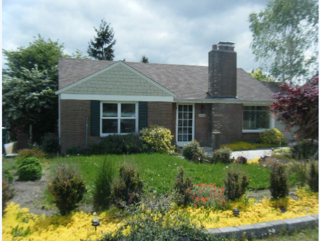This morning via Twitter, Talon Title asked me what the difference in rate is between a conforming and jumbo mortgage. Currently, as of October 1, 2011, the jumbo loan limit is set to be reduced unless Congress passes an extension. In the Seattle area, the loan amount for jumbos will be anything over $506,000 (currently the loan limit is $567,500) for a single family dwelling. Ben Bernanke has stated that private banking will step in to finance these borrowers needing a mortgage over the conforming loan amounts…this is at a price. He doesn't feel this will squeeze those borrowers out of the market. I wonder if this will squeeze more buyers into adjustable rate mortgages.
Here's the difference in rates based on current pricing (as of 8:30 a.m. on July 14, 2011) with 740+ credit and an 80% loan to value. We know the difference in the greater Seattle area between a jumbo and conforming rate will be $61,500 in down payment or equity.
Conforming loan amount of $417,000 or lower.
30 Year Fixed: 4.500% (apr 4.602).
5/1 ARM: 3.000% (apr 3.292). With 5/2/5 caps, this product is fixed at 3.000% for 60 months (P&I $1686) and then may adjust up 5% to 8.000% at the 61st payment (P&I $2744) or as low as 2.25% (P&I $1114). The rate will continue adjust up or down no more than 2% annually on the anniversary date and may never be higher than 8% or lower than 2.25%. Based on a $400,000 loan amount.
Conforming High Balance loan amount of $417,001 to $567,500 (for King County, Snohomish County or Pierce County).
30 Year Fixed: 4.625% (apr 4.602).
5/1 ARM: 3.875% (apr 3.912). With 5/2/5 caps, this product is fixed at 3.875% for 60 months (P&I $2379) and then may adjust up 5% to 8.875% at the 61st payment (P&I $3786) or as low as 2.75% (P&I $2102). The rate will continue adjust up or down no more than 2% annually on the anniversary date and may never be higher than 8.875% or lower than 2.75%. Based on a $506,000 loan amount.
5/1 ARM: 2.875% (apr 3.231). With 5/2/5 caps, this product is fixed at 2.875% for 60 months (P&I $2099) and then may adjust up 5% to 7.875% (P&I $3420)at the 61st payment or as low as 2.25% (P&I $1953). The rate will continue adjust up or down no more than 2% annually on the anniversary date and may never be higher than 7.875% or lower than 2.25%. NOTE: 5% additional down payment (75% LTV) is required for this scenario. Based on a $506,000 loan amount.
Non-Conforming – Jumbo loan amounts $567,501 and higher (until October 1, 2011).
30 Year Fixed: 5.250% (apr 5.371).
5/1 ARM: 3.875% (apr 3.904). With 5/2/5 caps, this product is fixed at 3.875% for 60 months (P&I $2669) and then may adjust up 5% to 8.875% at the 61st payment (P&I $4246) or as low as 2.75% (P&I $2358). The rate will continue adjust up or down no more than 2% annually on the anniversary date and may never be higher than 8.875% or lower than 2.75%. Based on a $567,501 loan amount.
Let's pretend that it's October 1, 2011 and that the changes to conforming loan limits are in place and somehow, mortgage rates are exactly the same as what I've quoted above.
The difference between the conforming high balance and jumbo rates are currently 0.625% in interest rate with the 30 year fixed mortgage. A loan amount of $506,001 or more (proposed future jumbo) would have a $193 higher mortgage payment with the jumbo rate over the conforming high balance based on rates above.
Are people going to stop buying homes that are in the current conforming high balance price range? I don't think so… I do think that when the conforming loan limits are reduced later this year, it will cause some to select mortgage programs they might not have considered such as adjustable rate mortgages or piggy-back second mortgages. It seems to me that Congress should allow the temporary higher loan limits to stay in place until housing becomes more stable. There was some discussion during testimony yesterday by Congressman Miller in California, however as I mentioned, Ben Bernanke doesn't seem to think that the reduction in loan limits will impact housing significantly. We'll know more in a few months…and don't forget, Fannie has issued "warnings" via their FAQs that we may see loan limits further reduced effective January 1, 2012.
Just for fun… since we're pretending to be in the future, here's a trip down 80s memory lane:










Recent Comments